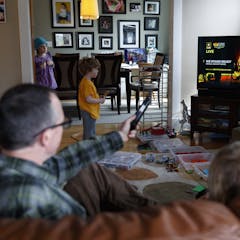
Artikel-artikel mengenai Parenting
Menampilkan 1 - 20 dari 849 artikel

One in 20 Australians has ADHD. But some people call the condition ADD. What’s the difference?

When someone has mental illness, their families can experience distress, stress, fear, powerlessness, and still love.

In the space of three days, there have been two devastating knife attacks. Your child may have seen these on the news or social media. Or they might be hearing about it from friends.

Attachment theory is the notion that in the first year of life, the ways in which a parent and caregiver respond to a child’s needs shape a child’s expectation of relationships across their lifespan.

It’s hard not to shout guidance at kids’ sports games. But there are ways to do this without pressuring or criticising your child.

Donor conception, surrogacy, artificial womb technologies … a new book delves into how families are changing.

Most children will eventually consume news and current affair programs, but is there a way for parents to minimise the impacts of distressing media?

Parents and other supportive adults can learn to recognize young people’s symptoms of disordered eating, which is a spectrum of unhealthy eating patterns and behaviour.

Easter is the time for chocolate. This can also make it very tricky for parents to manage their kids’ chocolate intake.

Extra sport, music or dance can be a great way to develop your child’s interests and skills. But it can also be expensive and stressful for families.

Neither hopefulness nor childhood development can occur in a vacuum. Strong relational bonds matter, too.

To First Nations women, ‘care’ is more broad and all-encompassing than traditional definitions. We need a new approach to capturing, and appreciating, their work, paid and unpaid.

New research shows how current messages to ‘simply avoid’ sexting do not work for young people.

Whether LGBTQIA+, or sceptical of romantic love as the best foundation for their family, many are looking to the Internet to find co-parenting partners with whom to raise a child.

Vaccine skepticism, and the broader medical mistrust and far-reaching anxieties it reflects, is not just a fringe position in the 21st century.

Many families want to set ground rules to reduce their screen time – and have time to connect with each other, without devices. Here’s where to start.

Relationship anarchists argue that we should relate to one another as equals and accept that intimacy can take many forms.

While the Ruby Franke case is an extreme example, it raises important questions of sharing children’s lives online.

Families in the UK play a significant role in introducing children to colourist views. They can also be instrumental in challenging them.

We tend to think when children are using screens, they are passive and sitting still. But they can move in response to what they watch. Or get inspiration for what to play next.
